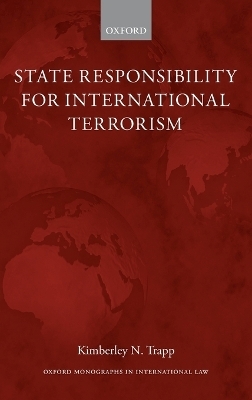
State Responsibility for International Terrorism
Seiten
2011
Oxford University Press (Verlag)
978-0-19-959299-9 (ISBN)
Oxford University Press (Verlag)
978-0-19-959299-9 (ISBN)
International law imposes a range of obligations related to terrorism on states, including the duty to prevent terrorist acts, to extradite terrorists or prosecute them, and not to participate in terrorist activities. This book examines how the rules of state responsibility can be used to enforce these obligations and to respond to violations.
The rules of state responsibility have an important but under-utilized role to play in the terrorism context. They determine both whether a breach of primary obligations has occurred, through the rules of attribution, and the consequences which flow from that breach, including the possible adoption of responsive measures by injured states. This book explores the substantive international legal obligations and rules of state responsibility applicable to international terrorism and examines the problems and prospects for effectively holding states responsible for internationally wrongful acts related to terrorism. In particular, it analyses the way in which the implementation of state responsibility for international terrorism may be affected by the self-determination debate, any applicable lex specialis (including the jus in bello), and sub-systems of international law (such as the WTO-), as well as the interaction between determinations of individual criminal responsibility and the implementation of state responsibility.
The international community has responded to the threat of international terrorism both through a security/jus ad bellum paradigm and by creating an international criminal law framework to address the conduct of non-state terrorist actors. The secondary rules of state responsibility analysed in this book cut across both approaches as they apply, whether states breaching their primary obligations relating to terrorism through participation in or a failure to prevent or punish terrorism. While this book identifies a number of problems in implementing state responsibility for international terrorism, it also highlights the prospects for the rules of state responsibility to make a crucial contribution to maintaining respect for obligations which lie at the very foundations of the contemporary international legal order, and to restoring the relationships between states if those obligations are breached.
The rules of state responsibility have an important but under-utilized role to play in the terrorism context. They determine both whether a breach of primary obligations has occurred, through the rules of attribution, and the consequences which flow from that breach, including the possible adoption of responsive measures by injured states. This book explores the substantive international legal obligations and rules of state responsibility applicable to international terrorism and examines the problems and prospects for effectively holding states responsible for internationally wrongful acts related to terrorism. In particular, it analyses the way in which the implementation of state responsibility for international terrorism may be affected by the self-determination debate, any applicable lex specialis (including the jus in bello), and sub-systems of international law (such as the WTO-), as well as the interaction between determinations of individual criminal responsibility and the implementation of state responsibility.
The international community has responded to the threat of international terrorism both through a security/jus ad bellum paradigm and by creating an international criminal law framework to address the conduct of non-state terrorist actors. The secondary rules of state responsibility analysed in this book cut across both approaches as they apply, whether states breaching their primary obligations relating to terrorism through participation in or a failure to prevent or punish terrorism. While this book identifies a number of problems in implementing state responsibility for international terrorism, it also highlights the prospects for the rules of state responsibility to make a crucial contribution to maintaining respect for obligations which lie at the very foundations of the contemporary international legal order, and to restoring the relationships between states if those obligations are breached.
Kimberley N. Trapp, Lecturer in Law, Newnham College, University of Cambridge
1. Introduction ; 2. The Prohibition of State Terrorism and Questions of Attribution ; 3. Obligations to Prevent and Punish Acts of International Terrorism ; 4. The ICJ's Jurisdiction Over Disputes Relating to State Responsibility for International Terrorism ; 5. Measures Adopted in Response to International Terrorism ; 6. The Relationship Between Individual Criminal Responsibility and State Responsibility in the Terrorism Context ; 7. Conclusions
| Erscheint lt. Verlag | 16.6.2011 |
|---|---|
| Reihe/Serie | Oxford Monographs in International Law |
| Verlagsort | Oxford |
| Sprache | englisch |
| Maße | 159 x 238 mm |
| Gewicht | 648 g |
| Themenwelt | Recht / Steuern ► EU / Internationales Recht |
| Recht / Steuern ► Öffentliches Recht ► Völkerrecht | |
| Sozialwissenschaften ► Politik / Verwaltung | |
| ISBN-10 | 0-19-959299-3 / 0199592993 |
| ISBN-13 | 978-0-19-959299-9 / 9780199592999 |
| Zustand | Neuware |
| Haben Sie eine Frage zum Produkt? |
Mehr entdecken
aus dem Bereich
aus dem Bereich


